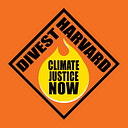Prison and Fossil Fuel Divestment Alumni Organizers Announce Partnership
Groups see connection in fight for an ethical and just institution
For the first time ever, alumni organizers with Fossil Fuel Divest Harvard (FFDH) and the Harvard Prison Divestment Campaign (HPDC) announced that they will formally and substantively partner, linking up their respective calls for Harvard’s divestment from fossil fuels and prisons to insist on a full ethical restructuring of the endowment that permanently ends the university’s extractive investment model.
The two groups — each composed of alumni around the world who identify with one or both campaigns — demonstrated their commitment to the partnership, and to building a joint base, with a co-hosted political education session in September, entitled “Connecting the Dots: Capitalism, Climate Catastrophe, and the Carceral State.”
Both campaigns have a high profile on campus and in the wider Harvard community. Earlier this year, HPDC filed a lawsuit against the university over its investments in the prison system, while the climate protest staged by FFDH at last year’s Harvard-Yale game garnered national media attention. Despite Harvard’s public statements in support of racial justice and climate action, however, the university has refused to divest. “Harvard continues to insist that the endowment is apolitical,” explains HPDC organizer Joe Pinto. “However, the people that it enriches and the damage that it wreaks have unmistakably political consequences.”
The campaigns’ partnership, following closely on the heels of tens of thousands of alumni voting to elect three new pro-divestment candidates to the Board of Overseers, signals a new era of mounting pressure from the alumni community on the administration to use Harvard’s vast financial capabilities to invest in a more just and resilient future.
The recent climate-driven wildfires that have raged across the west coast furnish a dramatic illustration of how communities are marginalized from all sides, creating displacement and compounding poverty while also relying on incarcerated laborers who are underpaid, face grave risks, and do not qualify for firefighting jobs upon release. Abolishing the police state and averting climate catastrophe will require change on an unprecedented scale, and in the words of HAA Elected Director and FFDH organizer Rashid Muhammed Yasin, “We’re not going to be able to build the ethical and sustainable institutions to power that change unless we start now.” Divestment represents only one lever of change, but that’s all the more reason that it must be accomplished without delay.
“Harvard’s resource-hoarding during covid has only underscored the bizarre cruelty of an endowment that seems to exist only to perpetuate itself — to make the university somehow invulnerable, regardless of whose vulnerability it doubles and triples to get there,” added Pinto. “We just couldn’t justify waging this fight alone anymore, not when Harvard will clearly do anything to grow rich, and ends up marginalizing communities from all sides in the process.”
During the collaborative event in September, FFDH and HPDC alumni organizers, who took turns facilitating sections, laid out the stakes of divestment, and their vision for partnership. Today’s carceral state, they underscored at the outset, is an extension of the institution of slavery — an institution founded on the exploitation not only of Black people but of the natural environment. Exploitation of people and resources is central to Harvard’s standard practices of wealth-building, they maintained, which should serve as a warning sign to all: under the current structure of the endowment, Harvard’s financial success is only ever in direct proportion to its moral failure.
“When we combine our forces with people recognizing that our struggles are connected,” says Yasin, “then we’ll really be able to start building a better world.” Sharing a platform of “Disclose, Divest, Reinvest,” FFDH and HPDC are focused not only on the harm done by Harvard’s pernicious investments, but also on the endowment’s potential to foster social good through community reinvestment, instead. “The work of our respective campaigns is about shifting from extraction and exploitation and hoarding into investment in caring and cooperation and health and wellness for people and the land,” HPDC activist Amber James. “Our success is mutually interdependent.”
To learn more about the FFDH alumni group, see https://www.divestharvardalumni.com/. To learn more about the HPDC alumni group, see https://harvardprisondivest.org/alumni/.
